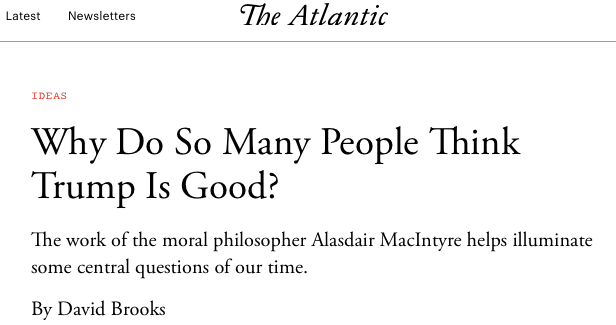This post was inspired by articles like the one below asking how it was that some Americans, MAGAs think Trump is good when everyone of value sees him as a fat, bigoted, criminal clown. The Atlantic’s answer is they’re detached from classic ideals of good or moral, and are now fueled by “narcissism, fanaticism, and authoritarianism”. I thought a more helpful explanation was that we’re going through a paradigm shift, perhaps progressing in our thought of what it means to be good.
Consider Thomas Kuhn’s analysis of scientific progress. Tomas Kuhn was a major American Philosopher of the 1960s-70s who claimed that science progress was not uniform but included long periods of “normal science” punctuated by change. A “crisis” leading a “Revolution” resulting in big changes in language, outlook and thinking, a “paradigm shift”. In the midst of these scientific revolutions, the experts of the old system fight bitterly against the new while being confounded by the fact that it seems to work.
Consider the resistance to relativity and quantum mechanics. Before 1905 the experts were doing fine: Professors taught and students learned — formulas, tools and techniques were handed over. Educated had respect and money, and could communicate. There were some few contradictions, as in why the sun burned hot, or why the sky was blue, but one could ignore these. You knew who the experts were, and they didn’t include Einstein, Bohr, Pauli, Plank.

But then came a few more problems, (inconsistencies in Kuhn-speak: radioactivity, photoelectrons, the speed of light… Einstein published on them in 1905, thoughts that few took seriously: imaginary time was a fourth dimension at right angles to the others, etc. The explantations seemed mad and for 14 years after he published, Einstein could not get a university job — anywhere. By 1919 detailed experiments suggested he might be right on a lot of things. It lead to the rise of a new group of experts plus a loss of esteem for the old, and a bunch of crank explainers who were neither but flourished in the confusion.
Hate abounded; new weapons and cures WWI removed aristocrats and beards. A popular book a lecture series of the time was “100 scientists against Einstein.” There followed a lost generation with no clear foundation. It took 50 years to resolve confusion, but there developed new thought leaders, a new language, new standard formulas and books were sold, and we were returned slowly to “normal science” in a new thought paradigm.
I see the conflict of opinion surrounding Mr Trump as a crisis in political thought similar to the crisis in science thought 100 years ago. Polite discourse if gone, replaced by stunts and insults. The government is currently shut, with 40% federal workers, those whose jobs are non-critical, on unpaid leave. It’s a collapse, not of morals, but of language. Trump hopes to use the shutdown, I think, to show that most of these 40%, are not needed. If they are not needed, it reflects a big lack in government — actually a big bloat in government. You can see why the opponents of cuts see Trump as a fascist who uses “dog whistles” to motivate “his base”, there is a lack of communication and a fear Trump may be right too, I think. The experiment in smaller government is being run as I write, and Trump seems confident that some 400,000 federal workers are not needed. Are they? Instead of debating, we’ve got to violence: two attempts on Trump’s life so far, the main college debater, Charlie Kirk, shot dead. Appropriate, I think, is Bob Dylan’s, “Times are a-changing” and “something is happening here, but you don’t know what it is, do you, Mr Jones.”
Other questions are being worked out as we speak -sending chills through the old order: Are China and Europe “ripping us off,” by free trade and stolen technology? Are tariffs an answer. Canadian and European leaders deride these thoughts openly, but I notice that both Canada and the EU have put heavy tariffs on Chinese goods.
Another issue is respect for experts. The Atlantic bemoaned that Trump supporters don’t respect experts on health, climate, and education, but perhaps they are lying. The seas have not risen as expected. Some warming may be good, or better than the remedies. Even if RFK Jr.’s ideas are wrong it seems that science has become unreliable (irreproducible), and that elite colleges aren’t fair in their assessment, nor do they provide great value.
Eventually things will settle down; we will some day have polite discourse. In 40-50 years, I suspect we’ll agree that some tariffs are good and that Trump’s tariffs are either to high or low, We’ll think that the climate push to no nuclear power, was a mistake, as was the giant, Ivanpah solar farm). And we’ll be able to discuss it civilly. I hope the change in thought takes less than 50 years.
Robert Buxbaum, October 3, 2025 – we are now entering another physics crisis too, I think.

